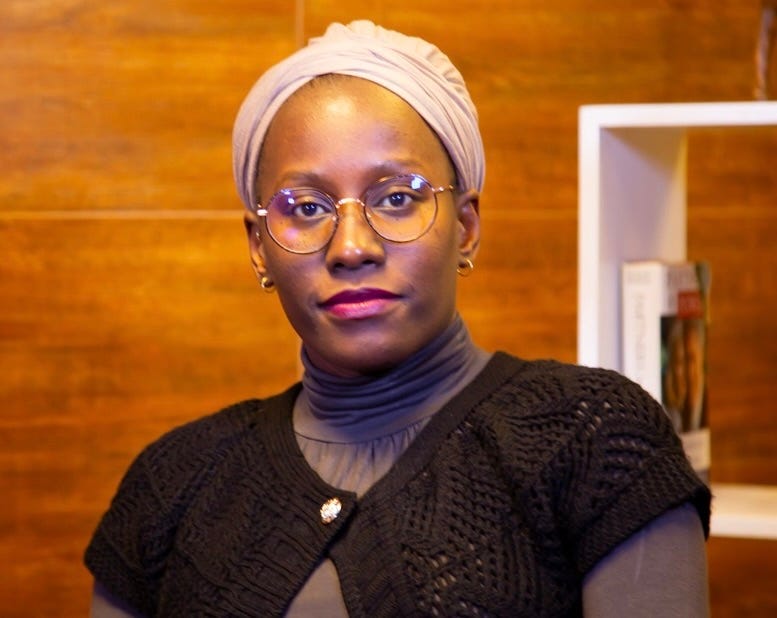Inside AFRIPAL’s Vision for African Parliaments
A conversation with Dr. Hannah Muzee on post-legislative scrutiny, AI, and the urgent need to connect academic research with parliamentary practice in Africa
What does it take to make legislative institutions more responsive, transparent, and future-oriented? For Dr. Hannah Muzee, co-organizer of the inaugural Africa Regional Conference on Parliament and Legislation (AFRIPAL), the answer lies in creating new spaces of collaboration between scholars and practitioners.
Hannah’s research focuses on deliberative politics, particularly how women engage in parliamentary debate and lawmaking. She has examined the Uganda Women’s Parliamentary Association and its success in passing gender-sensitive legislation (often in collaboration with male legislators). Through her involvement with the Center for Policy Analysis and its Parliamentary Watch initiative, she also observed a persistent disconnect between academic research and the everyday realities of parliamentary work. It was from this intersection of scholarship and practice that AFRIPAL was born.

In this conversation, she discusses the origins and ambitions of AFRIPAL, which brings together legislators, researchers, and civil society actors to rethink the role of parliaments in African democracies. She reflects on the emergence of post-legislative scrutiny (PLS), the potential of artificial intelligence, and the impact of COVID-19 on parliamentary innovation. Most of all, she makes a compelling case for why bridging the gap between research and practice is critical for building more resilient legislative systems—in Africa and beyond.
AFRIPAL will take place in Uganda from June 18-20. Registration is still open.
Beatriz Rey, Ph.D.
Beatriz: What inspired the creation of AFRIPAL, and why was now the right moment to launch a regional research conference on legislation and parliamentary affairs in Africa?
Hannah: Taking a broader look at the landscape, and from my interaction with the Center for Policy Analysis, which deals with parliament, and with its flagship project, Parliament Watch, which aims to bring parliament closer to the citizens, we saw some success in opening up parliaments. However, there remained a disconnect between parliaments, practice, and academia.
I began questioning why we have academic literature that is mostly peer-reviewed, intended for academia, and not easily translatable into practice or accessible to everyday people.
That realization came from my experiences during a research fellowship in South Africa, where I began questioning why we have academic literature that is mostly peer-reviewed, intended for academia, and not easily translatable into practice or accessible to everyday people. One reason is the paywalls (not everyone can afford access) and another is the language: it’s written in ways that are not accessible to civil society actors or easily translatable into policy and legislation.
We thought it was important to create a space where both academia and practice come together to deliberate and discuss ways to improve parliaments. This space, in a way, creates an avenue for plain-language discussions about the various challenges facing parliaments and legislation. It also allows for sharing best practices from across the continent and globally. Although the content is centered on Africa, the conference is not restricted to Africa.
Then we thought: how can we make this sustainable? One way was to build a community of practice, benchmarked on the International Association of Legislation. We had several meetings with them to understand how they operate: their conferences, their initiatives. We realized an African Association for Legislation could provide an institutional framework to drive strategic thought on parliament and legislation in Africa.
AFRIPAL is envisioned as a unique platform that brings together academia and practice in the same room — something that sets it apart from convenings that are either more academic or more practice-oriented. In terms of outputs, such as publications, we're aiming to have not just academic literature but also contributions from civil society and practitioners written in ways that are accessible to actors in the field. So that was the major motivation for AFRIPAL.
Beatriz: One of the key goals of the conference is to strengthen Post-Legislative Scrutiny (PLS). How would you describe the current state of PLS in African legislatures, and what best practices are emerging?
Hannah: I think post-legislative scrutiny, for much of Africa, is a new innovation, something we are just now realizing we need. And while we understand its importance, it's not something we can automatically implement. It requires a lot of capacity-building, especially for legislators to understand what it is and why it matters.
So far, the Westminster Foundation for Democracy has been leading efforts to promote post-legislative scrutiny across African parliaments. For example, at the conference, we have parliamentarians from Zambia, led by the WFD team. Zambia has successfully integrated PLS into parliamentary functions. In Uganda, PLS is still emerging. It starts with training staff and orienting them on why it's important.
I can’t yet point to clear best practices — that’s actually what the conference hopes to explore — since in many places it’s still new. There are discussions about why we focus on post-legislative scrutiny rather than pre-legislative scrutiny, as some argue they go hand in hand. After all, some laws are passed but never implemented due to resource constraints or lack of qualified personnel.
There’s a general sense that PLS is necessary, especially since we already have laws that have been in effect for years without being implemented or showing impact. So yes, it's important to examine those before moving forward with evaluating legislative outcomes more effectively.
For us, PLS is an innovation we're eager to discuss — learning from other jurisdictions, especially countries like the UK and Scotland that have implemented it successfully.
Beatriz: So maybe we can have a conversation post-conference as well. Another major theme is the Fourth Industrial Revolution and Artificial Intelligence. What are some of the most promising ways African parliaments are using — or could use — AI to improve their work?
Hannah: Yes, AI is another new conversation we want to explore. African parliaments have digitalized over the years, starting with making parliamentary information available online, digitizing the Hansard, which used to be unheard of, and committee reports that are now released immediately after meetings. Hansards are available right after plenary sittings, and sessions are televised not only nationally but also through social media.
Parliaments are very active on social media. For example, the Parliament of Uganda provides live updates during plenary and committee sessions. While digitization has advanced, we're still exploring how AI and digital technologies can enhance parliamentary functions. Again, this depends on capabilities: do parliamentarians and staff have the skills to use these technologies?
During digitization, MPs had to be given iPads and trained to access documents before sessions. Many found it challenging at first, but with ongoing training, they adapted. Now they are more accepting of digital tools. AI is something we see as the future of parliaments, and we are eager to explore it further.
Beatriz: One of the themes is also to explore how parliaments can respond to emergencies. How did crises like COVID-19 shape this part of the agenda?
Hannah: In Uganda — and across many African parliaments and the globe — COVID-19 and the lockdowns created a unique situation. Social distancing was essential, but some government functions, like Parliament, couldn’t be paused, especially in systems based on parliamentary governance.
Parliament had to go online. But in countries like Uganda, the digital infrastructure is underdeveloped, so it wasn’t just about going online. Parliament had to think beyond its physical walls. A large tent was erected in the parking lot to allow more space. Our plenary hall, built in the 1950s, was never expanded, yet we now have over 500 MPs.
COVID-19 forced innovation and rethinking of how parliaments function. Since then, Uganda has introduced regional parliaments — holding sessions in different regions, effectively transplanting parliament from the capital. I believe that’s one of the key lessons from COVID — it pushed us to redefine and adapt.
When we were co-creating the conference in 2022, we were just emerging from the pandemic, so it was important to include this theme.
Beatriz: Three years.
Hannah: Yes, three years. But even when we talk about emergencies, we're not only referring to COVID. Emergencies can include natural disasters, wars, and conflicts. Parliament cannot stop functioning during a crisis. It must redefine how it works.
We’re looking at how Uganda’s parliament evolved during wartime. There’s research about how the National Resistance Movement’s liberation struggle, through its civilian legislative relations from the bush, has shaped parliamentary representation. This has shaped what we have today — a hybrid of colonial institutions and wartime innovations.
We want to explore how parliamentary functions evolve during crises and how they can adapt to new contexts.
Beatriz: What kind of collaboration or engagement are you hoping to spark between scholars and practitioners attending the conference?
Hannah: The ultimate goal is to build a community of practice, which will become the African Association of Legislation — open to individuals and institutions. It will include current and former parliamentarians, academics, and policy institutions. This association will lead future AFRIPAL conferences, shaping their strategic direction.
We're also hoping it becomes a base for capacity-building, like training young MPs. In Africa, every new regime brings a wave of new legislators who need orientation. We hope the conference sparks collaborations that will support future AFRIPAL events.
The interim board already reflects this regional and professional diversity, with members from North, East, West, and Southern Africa — including retired MPs, active legislators, academics, and civil society.
Beatriz: Looking ahead, how do you imagine AFRIPAL evolving over the next five or ten years? What impact would you like it to have on legislative practice and scholarship across the continent?
Hannah: AFRIPAL is envisioned as a biannual conference. In the two years between conferences, we’ll have pre-conference workshops and engagements. We’re also launching the African Journal of Parliamentary Democracy, the African Parliamentary Democracy Series, and a blog to share current developments in African parliamentary legislation.
We want AFRIPAL to be the premier platform for legislative discussions on the continent — something everyone in the democracy and governance space wants to be part of.
Beatriz: For our readers around the world, what lessons or innovations do you think other parliaments and researchers can take from what’s happening in African legislative development today?
Hannah: While this may not be unique to Africa, we’ve embraced digital tools and social media to open up parliament. That, for me, is a best practice worth emulating globally.
Despite challenges with internet access and cost, more people are getting online. It’s easier now to communicate via WhatsApp than Zoom, for example. Telecom companies have also adapted to reach different audiences.
Leveraging social media to increase parliamentary transparency has been powerful. I believe that’s a key innovation others can learn from.
Beatriz: Thank you, Hannah. The work you and AFRIPAL are leading is important and inspiring.




